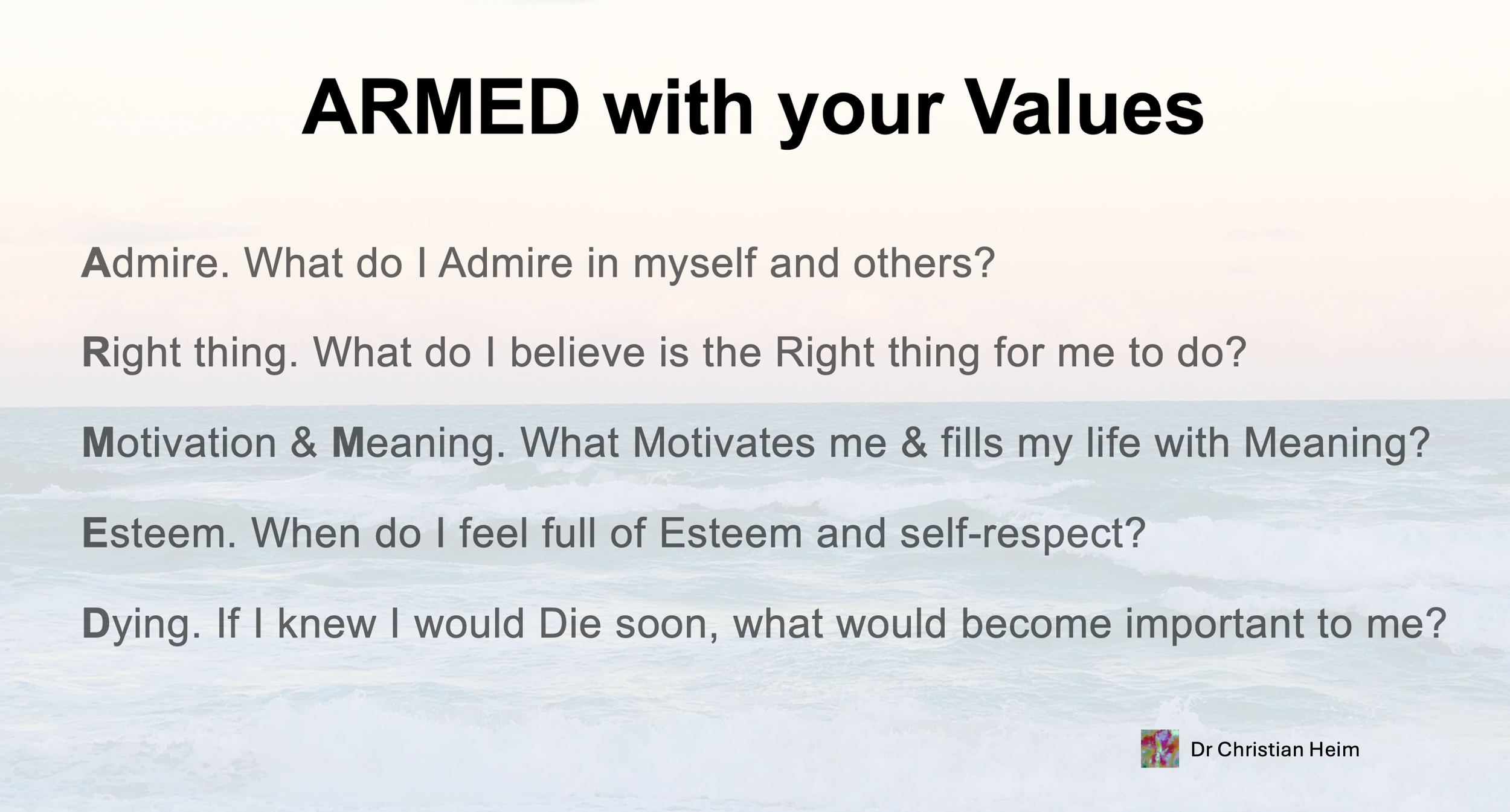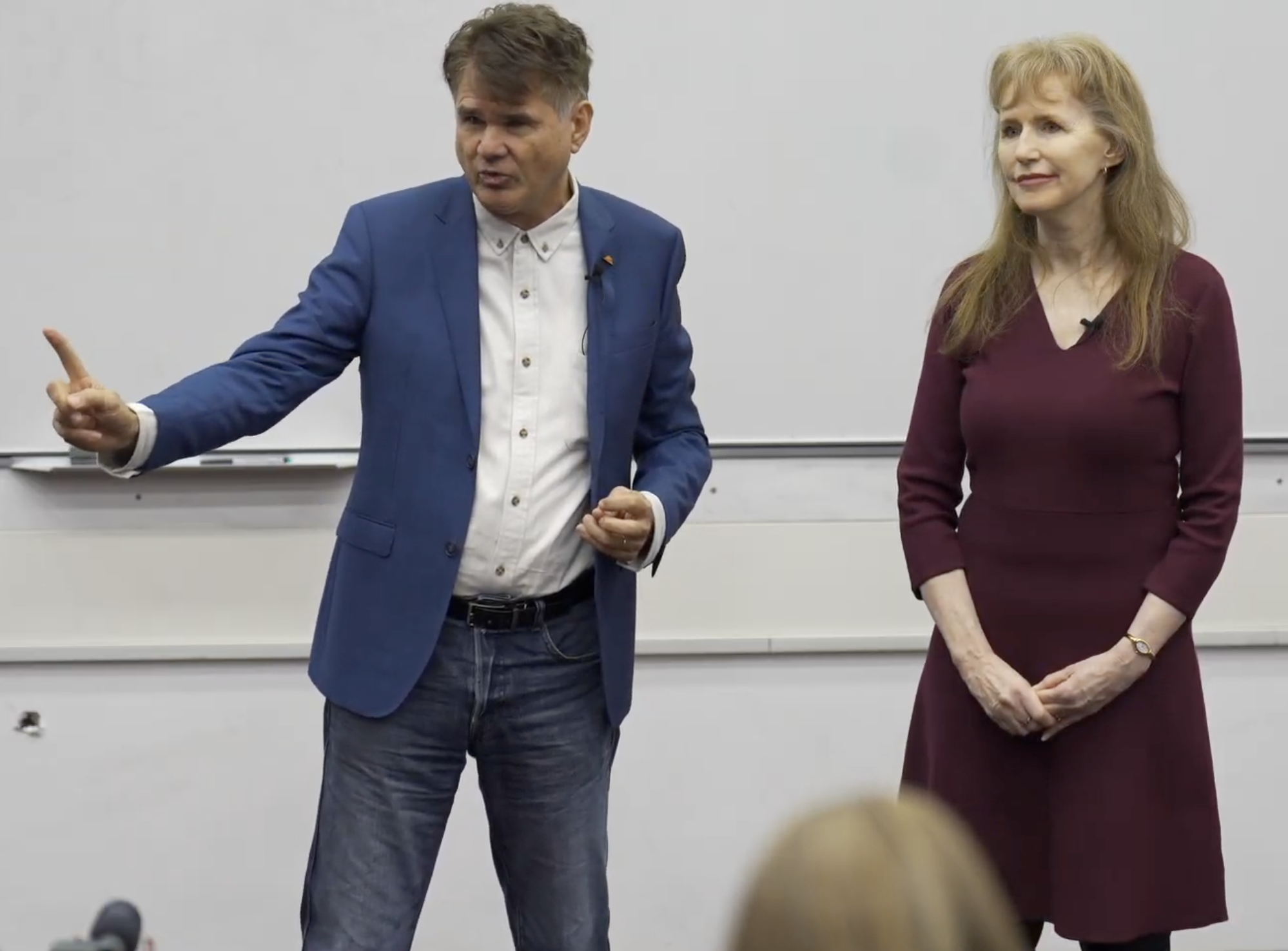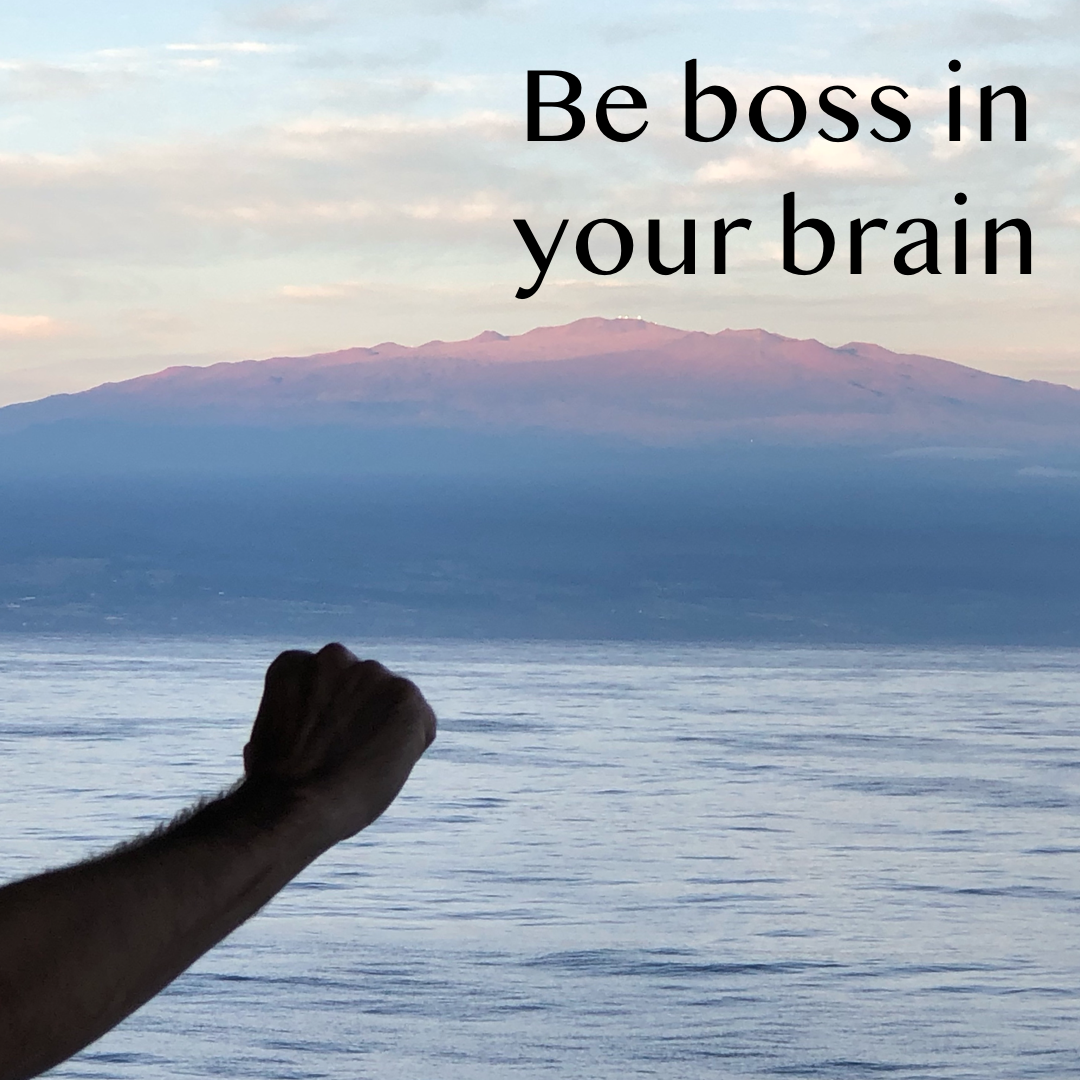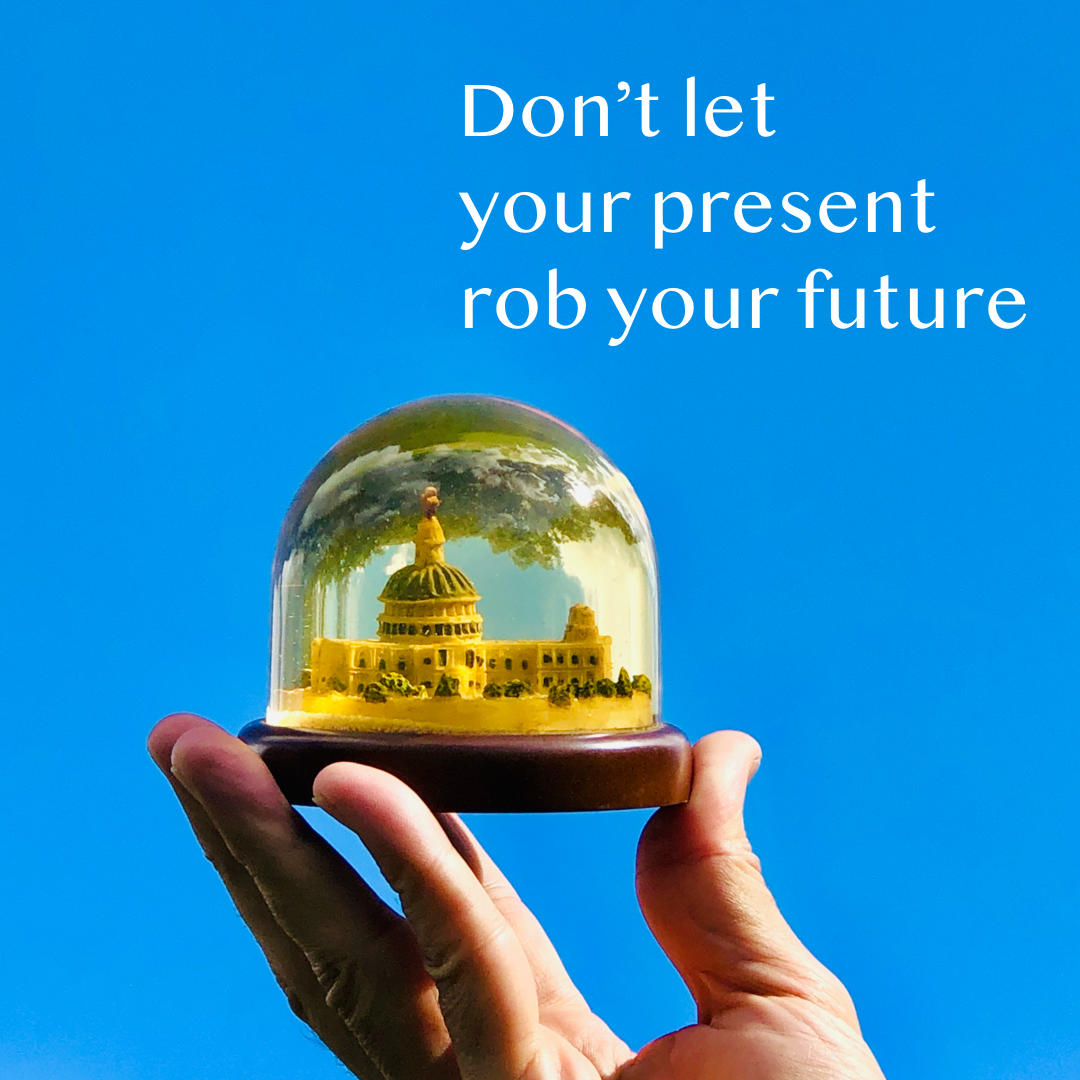courage for JOURNALISM
Dr Christian heim
Dr Caroline heim
VALUES
We need to know our VALUES as a compass for our intended life direction
We need COURAGE to choose to move towards our intended life direction
How can I know my values? Consider this tool while you sit quietly for a few hours:
Theory
You can find our posts on values HERE: what they are, and the theory behind them. To do anything, the brain has to value it.
What are values?
Values are “ambitions with a moral connotation”(1) and personal imperatives of what “ought to be.”(2) They interact with but are distinct from our personality.(3)
Our definition is:
Values are our culturally-inherited principles, refined by choice … to guide our priorities, goals, behaviours, and decisions.(4)
Values can be ideals (loyalty), legal principles (do not steal), leisure-based (have fun), socio-political (equality), workplace-based (greed is good), relational (be kind to others) and more. We naturally feel that others ‘ought’ to live by certain values, particular our own, while knowing that values vary from person to person. This leads to clashes and conflict. A list of values is endless. They are instilled into us as children by parents, teachers, collective history, culture, beliefs, the legal system, societal trends, and more. As we grow, we accept or reject our parents’ and others’ values while forming our own unique value system.
What’s the difference between goals and values?
This world emphasizes achieving goals. Make sure your goals line up with your values. Achieving goals while neglecting values can lead to depression. I’ve seen it in clinical practice: the successful businessperson who loses their family, the traveller chasing experiences but missing self-acceptance, the celebrity liked by all but close to no one.
COURAGE
Why have courage?
To live out what you believe, what you value and what you really want for yourself now and in the future.
What is courage?
While feeling fear, courage is choosing the right action for the right outcome
Theory
You can find our POSTS on courage HERE. They deal with what courage is, and the theory behind it.
Scientists have articulated the pathways in the brain which are active while people make decisions which involve courage (See Nili et al. study). This is exciting. In the study, people were asked to pull a trolley with a live snake as close to their faces as they could. Their brains were being imaged to see what brain-parts were involved in their decision-making.
Parts of the brain involved included the Orbito-Frontal Cortex (OFC) to coordinate decision-making, the subgenual Anterior Cingulate Gyrus (sgACG) which coordinates emotions, empathy and social cues, the Amygdala which generates feelings of fear, the Frontal Lobe for awareness, memories, beliefs and values and thinking, and the right Temporal Pole (rTP) to monitor and process social and emotional information.
In sorting through the complexity, the study found that once people chose courage it was easier for them to choose courage again in the future. People who didn’t choose courage found it harder to choose again in the future. This means that courage is a skill. It can be learned and practiced. You can get better at it. This, I believe, is highly significant.
THE COURAGE TO “face” your fear
F A C E : FEEL THE FEAR (from your amygdala, your fear, pain and alarm centre). If you didn’t feel fear you wouldn’t need courage. It’s always there. Even a bomb disposal expert may be afraid of snakes, a snake handler may be afraid of public speaking. Aim to let fear give you vital information, don’t let it enslave you.
F A C E : AWARENESS (in your Pre-Frontal Cortex, your home of planning, judging, remembering, and controlling emotions). Create awareness in your brain by observation your thoughts and feelings. Ask what am I thinking and feeling right now? This, essentially, is mindfulness. Be aware of the fear, and your beliefs, values and goals. With awareness, you can choose to focus on your values and goals and not on the fear.
F A C E : CHOOSE COURAGE (in your Orbito-Frontal Cortex, your decision-making centre). With awareness, focus on what you want and not on fear. You can Choose Courage by being in a mindset of determination. Evaluate the risks and rewards in favour of what your future self really wants as an outcome, rather be a slave to fear.
F A C E : EMPATHY (in your Anterior Cingulate Gyrus, your seat of empathy). Use empathy for others (I’ll make mum proud, contribute to society, make the world a better place, ensure my future-self does well) as motivation to choose courage. Philosopher David Hume knew how strongly we’re motivated by others. His ideas have been confirmed in recent studies. Empathy helps you CHOOSE COURAGE for your significant others and for your future self.
DEVELOPING THE COURAGE TO “face” your fear
F A C E : FEEL THE FEAR But if you practice whatever you need to practice, the fear subsides. Bomb disposal experts practice thousands of times. Public speakers, musicians, gymnasts, actors, snake handlers, magicians, soccer players and all performers practice, practice and practice more. It decreases fear.
F A C E : AWARENESS Cultivate awareness through meditation, deep breathing and mindfulness.
F A C E : CHOOSE COURAGE Through getting into a mindset of determination. Remember when you felt powerful, capable, and reliable.
F A C E : EMPATHY Cultivate empathy by spending time with people you love. Feel that you live life through other people: family, friends, colleagues and more. Aim to spend one less hour on screens daily and one more hour with people daily. To know how to do this look HERE.
RESOURCES
@collegementalhealthpodcast @drchristianheim
PODCAST
Caroline and Christian answer student mental health questions on spiralling thoughts, work/life balance, comparing yourself with others, burnout, making friends, substance abuse and many more
BIBLIOGRAPHY
FOR COURAGE
Findyartini, Ardi, Estivana Felaza, Daniar Setyorini, and Rita Mustika. "Relationship between empathy and motivation in undergraduate medical students." GMS journal for medical education 37, no. 4 2020: Doc43.
Magnano, Paola, Anna Paolillo, Silvia Platania, and Giuseppe Santisi. "Courage as a potential mediator between personality and coping." Personality and individual differences 111, 2017: 13-18.
Nili, Uri, Hagar Goldberg, Abraham Weizman, and Yadin Dudai. "Fear thou not: activity of frontal and temporal circuits in moments of real-life courage." Neuron 66, no. 6, 2010: 949-962.
Zaki, Jamil, "Empathy: a motivated account." Psychological bulletin 140, no. 6, 2014: 1608
Zavaliy, Andrei G., and Michael Aristidou. "Courage: A modern look at an ancient virtue." Journal of Military Ethics 13, no. 2, 2014: 174-189.






